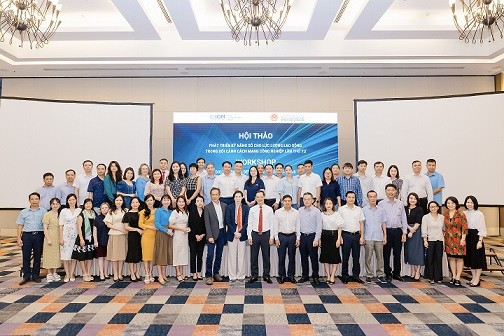
IOM supports Vietnam to improve the nation’s skill development: IOM Chief of Mission
Latest
 |
| The workshop on “Leveraging TVET system for Digital Skill development and Skill Mobility in the context of the Fourth Industrial Revolution". (Photo: TT) |
Last week, more than 300 high-ranking officials, experts from Government agencies, Technical and Vocational Education and Training (TVET) institutions, educators, embassies, international organizations, and the private sector gathered in person and online for the workshop on “Leveraging TVET system for Digital Skill development and Skill Mobility in the context of the Fourth Industrial Revolution".
The International Organization for Migration (IOM) in Vietnam and the General Directorate of Vocational Education and Training (DVET) under the Ministry of Labour, Invalids and Social Affairs completed their 24-month collaboration that promoted free-to-access learning courses via online learning platform “www.congdanso.edu.vn”, which attracted more than 15,100 people since its launch and contributed to upskilling of Vietnamese workers, especially migrant workers in the industrial areas.
The workshop provided an opportunity to share reflections after the collaboration, while inviting the international and national experts to share their insight on the priority areas for improvement in skills development of Vietnamese workers, in current rapidly changing labour market context.
Despite the continued strong economic growth, high youth unemployment rate in the country (7.61% compared to the national average at 2.25%) has been raising concerns for policymakers, resulting in the national plans and policies that prioritize TVET reform, reskilling and upskilling programs and related initiatives for improved labour productivity.
In particular, the industrial revolution 4.0, or the rapid transformation of industries and societal structures as observed in Vietnam in the recent years, has increased the sense of urgency in understanding the changing jobs landscape and aligning the conventional vocational education and training system to meet the actual skills demands.
The project “Supporting the Government of Viet Nam in the Digital Transformation of Labour through Enhancing Technical and Vocational Education and Training” was implemented in partnership between IOM and DVET, with the support from Viet Nam General Confederation of Labour (VGCL). The collaboration with IOM focused on addressing the immediate skills needs of the current workforce while showcasing the potential of online learning platform to relevant stakeholders-from TVET instructors to students, workers, and policymakers.
The platform and key digital skills learning courses were developed in partnership with Microsoft, which has been assessed as a successful example of public-private partnership in this area of workers skills development, where close collaboration between policymakers and industry leaders is critical for sustainable impact.
Prioritizing those who have limited access to learning opportunities but are faced with immediate needs to learn new digital skills that came to permeate their daily life since the pandemic, the project targeted TVET institutions and industrial areas in Thai Nguyen, Quang Nam, Dong Nai, and Binh Duong with 163 instructors from 50 TVET institutions in the four target provinces were trained.
They then rolled out hybrid skills learning sessions-introducing online learning platforms and incorporating online courses in their teaching-for almost 3,000 students and workers. Under this project, 31,100-course completions on digital, soft, job application, and entrepreneurship skills were recorded on the platform. Nearly 26,000 certificates were issued by Microsoft for digital literary skills, which attracted the most significant number of users.
IOM Chief of Mission, Ms. Park Mihyung highlighted: “Investing in skills development in Viet Nam is very important. It helps people get better jobs and work more productively, which makes the country stronger in the world economy. That’s why IOM takes pride in our work, especially our e-learning platform. It improves access for low-skilled workers and migrant workers to gain essential skills, such as technical, soft, and digital skills. This reduces their vulnerability, helps them navigate in the digital environment, making them more adaptable and resilient.”
“The online learning platform is just one of the prime examples of how IOM, the Government agencies, and the private sectors collaborate to create innovative solutions. Together, we are supporting Vietnam’s goal of elevating its vocational education to gradually match top regional countries by 2030, with a vision to 2045,” Ms. Park Mihyung added.
The project also supported the DVET in producing “Reference Book on Digital Transformation in Vocational Education and Training”, which aims to provide the national TVET policymakers and relevant stakeholders with practical guidance in exploring different priorities and issues related to the digital transformation for TVET system. For example, the book presents six essential elements of the digital transformation ecosystem. It illustrates school-based administrative procedures to be simplified if the data collection and analysis system is used and connected.
IOM and DVET will continue to leverage and update the online learning platform and toolkits developed from the project to contribute to skills development for the Vietnam labour force, and engage with various stakeholders, including companies and employers, to expand this model.

















